【參訪出訪】中央社報導_台灣高教10校印度招生 科技加華語吸引力十足
台灣高教10校印度招生 科技加華語吸引力十足
中央社報導
114年10月6日
(中央社記者李晉緯新德里6日專電)台灣10所學校組團今天在印度參加高教展,希望招收優秀印度學生到台灣就讀。由於台灣半導體在國際間極具盛名,此產業也符合印度發展方針,加上以華語授課,能讓學生同時增進語言能力,2項優勢結合,成為台灣各校在印度招生最大賣點。
印度商工總會(FICCI)主辦的高等教育高峰會暨教育展,關注全球高教生態系統的轉變與發展,每回都吸引各國教育界傑出人士、政策制訂者與學者專家參與,台灣今年也由印度台灣華語教育中心-國立清華大學計畫辦公室主任王偉中組團到印度參加。
同時也是國立清華大學印度中心主任的王偉中對印度的生態十分熟悉,他表示,印度學生對學習半導體相關知識有濃厚興趣,而半導體、AI、無人機等都是台灣強項,加上是華語教學,課堂上用華語將專業知識介紹給印度學生,「半導體和華語結合,對台灣的大學招生非常有利」。
駐印度代表陳牧民告訴中央社記者,每年有超過10萬名國際學生在台灣求學,目前是世界第4大經濟體的印度,在台灣念書的學生卻只有約3000人,盼透過這次機會,讓更多印度人知道台灣豐富的教育資源與教育機會。
陳牧民表示,印度正積極發展半導體產業,除了硬體之外,人才培育也很重要,台灣在政府及各大學的努力下,相關的學程、計畫非常多,台灣的學校從這個面向切入招生,相信能招收到優秀的印度學生到台灣就讀。
宜蘭大學特聘教授、前駐印度代表處科技組組長王金燦接受中央社訪問時說,他認為印度應更積極讓學生到台灣學習,尤其是瞭解一些在工作文化上的細節,因為台灣的學界與業界有很好的連結,未來若要合作推廣高科技時,這將是創造台灣、印度雙贏的一大機會。
在台灣拿到博士學位的高雄醫學大學國際組組長庫碼(Vinoth Kumar)認為,台灣與印度最大的差別,在於有完善的研究氛圍與研究環境,這讓他獲得博士學位的過程非常順利。
庫碼表示,他很鼓勵印度學生到台灣念書,「因為台灣能獲得高品質教育,且是個安全可靠的地方,台灣的文化和整體氣氛,能為印度學生成為具有潛力的國際學生,提供一個絕佳的機會」。
靜宜大學國際學生招生資深經理柯羅許(Khire Rushikesh Ulhas)表示,他於2007年到台灣讀書後,發現台灣的(高等)教育著重在研究上,而非只是填鴨式的教育,這讓他很享受在台灣就學的時光。
柯羅許畢業後留在台灣,先到一般公司工作了2年半,2018年到靜宜大學任教至今,如今重回印度招生,他以自身經驗為例,想告訴印度學生,有受國際教育的經歷十分重要,而台灣正提供這樣的好機會,且在台灣念完書,可完全依照自己意願,選擇要留在台灣深耕,或是回印度貢獻所長。
高教展6日、7日在新德里進行,預計共有超過1000名印度國內外代表、逾50個單位參與展會,並有數場B2B會議。台灣共有國立清華大學、國立高雄師範大學、國立虎尾科技大學、國立宜蘭大學、國立暨南國際大學、淡江大學等10校參與。
Taiwan’s 10 Universities Recruit Students in India – Tech and Mandarin Language Offer Strong Appeal
Central News Agency (CNA) Report
October 6, 2025
(New Delhi, CNA Correspondent Lee Chin-Wei) — A delegation of ten Taiwanese universities participated today in a higher education fair in India, aiming to attract outstanding Indian students to study in Taiwan. Taiwan’s world-renowned semiconductor industry aligns well with India’s national development strategies, and the combination of technological expertise and Mandarin instruction has become the major appeal for Indian students considering Taiwan as their study destination.
The higher education summit and exhibition, organized by the Federation of Indian Chambers of Commerce and Industry (FICCI), focuses on global transformations and developments in higher education ecosystems. The event gathers leading educators, policymakers, and experts from around the world. This year, Taiwan’s delegation was led by Dr. Wang Wei-Chung, Director of the Taiwan Mandarin Education Center in India and Head of the Project Office at National Tsing Hua University (NTHU).
Dr. Wang, who also serves as Director of NTHU’s India Center, is well-acquainted with India’s academic landscape. He noted that Indian students show great enthusiasm for learning about semiconductors. Since Taiwan excels in semiconductors, AI, and drone technology, and delivers such programs in Mandarin, students can simultaneously enhance their language skills and professional knowledge. “The combination of semiconductors and Mandarin makes Taiwanese universities highly competitive in attracting Indian students,” Wang said.
Taiwan’s Representative to India, Chen Mu-Min, told CNA that over 100,000 international students study in Taiwan each year. However, among them, only about 3,000 come from India — now the world’s fourth-largest economy. He hopes this event will allow more Indians to discover Taiwan’s rich educational resources and opportunities.
Chen added that India is vigorously developing its semiconductor industry, where talent cultivation is key. Taiwan’s government and universities have established numerous programs related to this field. “By promoting recruitment from this angle, Taiwanese universities are well-positioned to attract talented Indian students,” he said.
Professor Wang Chin-Tsan of National Ilan University, who previously headed the Science and Technology Division at the Taipei Economic and Cultural Center in India, told CNA that India should actively encourage more students to study in Taiwan, especially to gain an understanding of Taiwan’s workplace culture. “Taiwan has strong links between academia and industry,” Wang explained. “This connection will create win-win opportunities for Taiwan and India in advancing high-tech cooperation.”
Dr. Vinoth Kumar, now Head of the International Office at Kaohsiung Medical University, earned his Ph.D. in Taiwan. He said Taiwan’s biggest advantage compared with India is its well-established research environment and academic atmosphere, which allowed him to complete his Ph.D. smoothly.
“I strongly encourage Indian students to study in Taiwan,” Kumar said. “Taiwan offers high-quality education, a safe and reliable living environment, and a welcoming culture — an excellent setting for Indian students to develop as capable international professionals.”
Mr. Khire Rushikesh Ulhas, Senior Manager for International Student Recruitment at Providence University, shared a similar experience. Having first arrived in Taiwan in 2007 as a student, he discovered that Taiwanese higher education focuses on research rather than rote learning, which made his study experience highly rewarding.
After graduation, Khire worked in the private sector for two and a half years before joining Providence University as a lecturer in 2018. Returning to India now to recruit students, he uses his own story to illustrate the benefits of an international education. “Taiwan offers a great opportunity — after completing your studies, you can choose freely whether to stay and build your career in Taiwan or return to India to contribute your expertise,” he said.
The higher education exhibition runs October 6–7 in New Delhi, with over 1,000 representatives from more than 50 domestic and international institutions participating. Taiwan’s delegation includes National Tsing Hua University, National Kaohsiung Normal University, National Formosa University, National Ilan University, National Chi Nan University, Tamkang University, and other institutions.
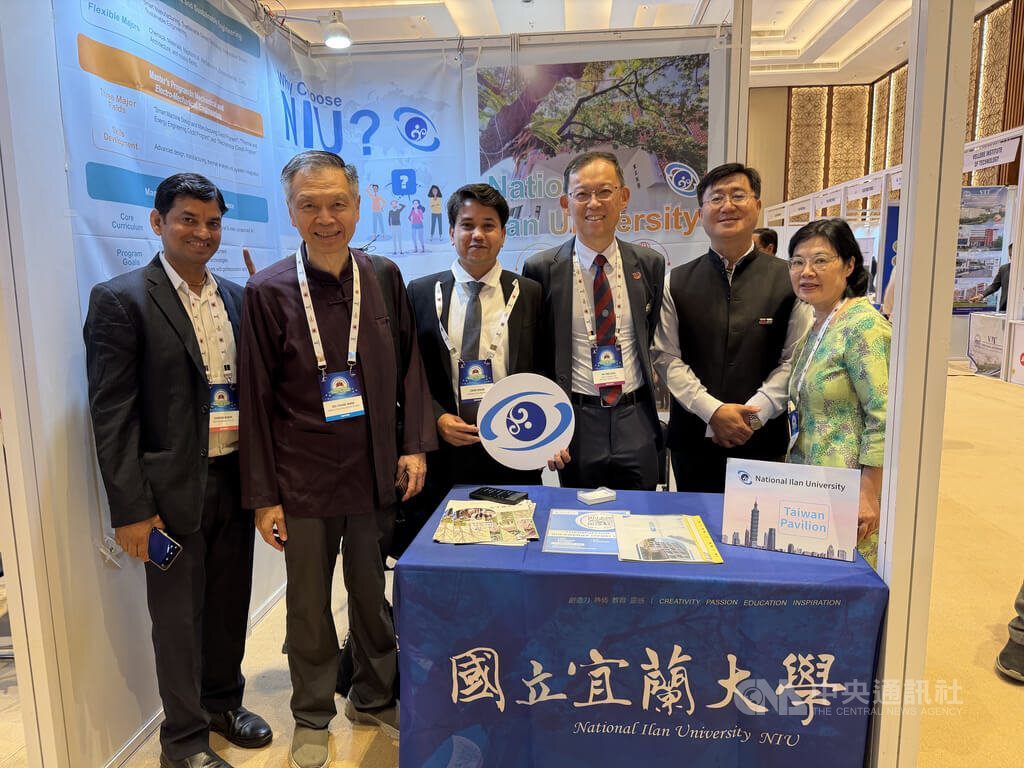
台灣10所學校組團到印度參加高教展,希望招收優秀印度學生到台灣就讀。圖為國立宜蘭大學在高教展的攤位。中央社記者李晉緯新德里攝影
A delegation of ten Taiwanese universities participated in a higher education fair in India, aiming to recruit outstanding Indian students to study in Taiwan. The photo shows National Ilan University’s booth at the fair.
(Photo by CNA correspondent Lee Chin-Wei, New Delhi)
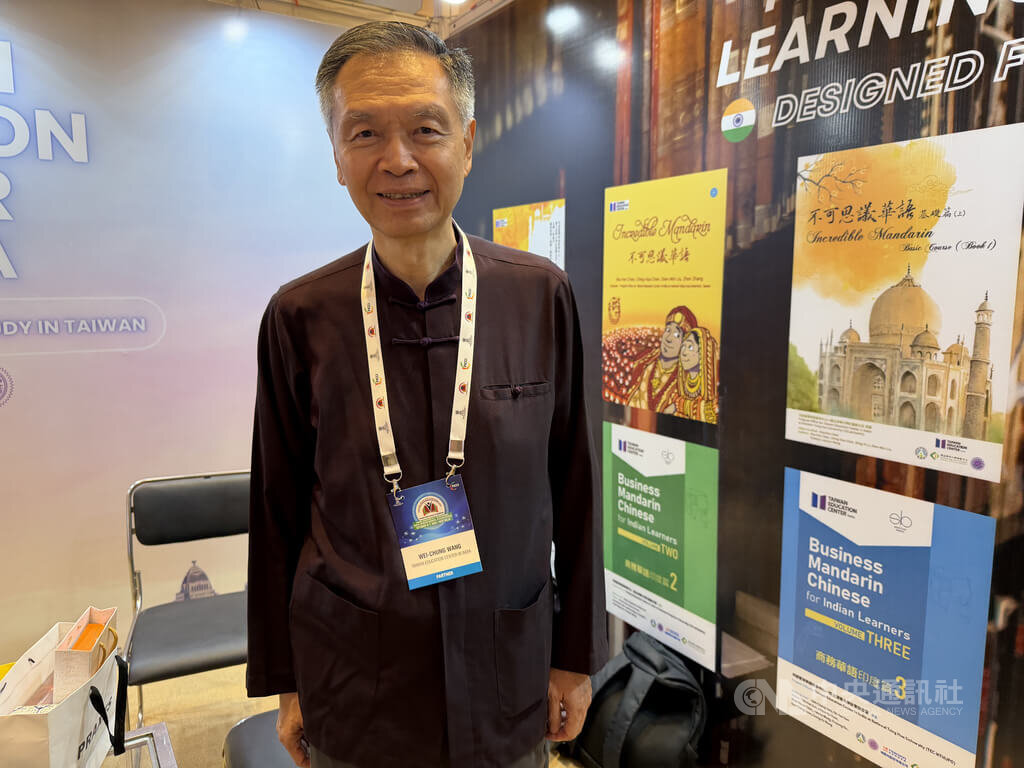
台灣10所學校組團到印度參加高教展,希望招收優秀印度學生到台灣就讀,印度台灣華語教育中心-國立清華大學計畫辦公室主任王偉中(圖)認為,台灣的半導體、華語2項優勢結合,成為各校在印度招生最大賣點。中央社記者李晉緯新德里攝 114年10月6日
A delegation of ten Taiwanese universities participated in a higher education fair in India, aiming to recruit outstanding Indian students to study in Taiwan. Dr. Wang Wei-Chung (pictured), Director of the Taiwan Mandarin Education Center in India and Head of the Project Office at National Tsing Hua University, said that the combination of Taiwan’s strengths in semiconductors and Mandarin education has become the greatest advantage for Taiwanese universities in attracting Indian students.
(Photo by CNA correspondent Lee Chin-Wei, New Delhi, October 6, 2025)
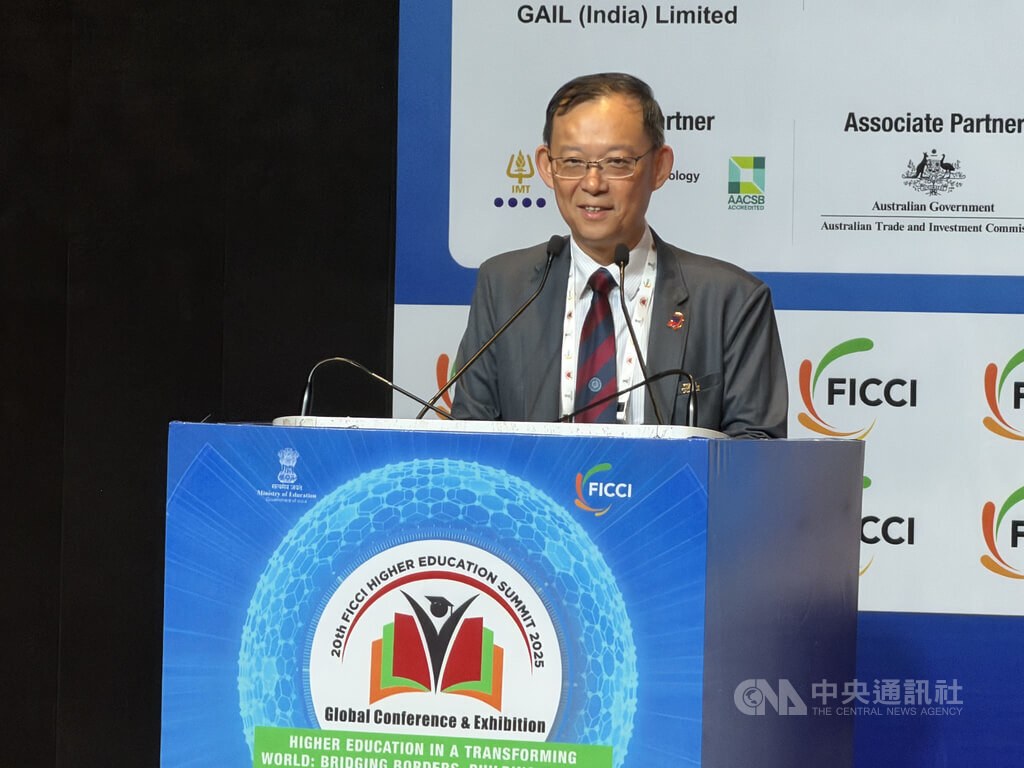
在台灣拿下博士學位的高雄醫學大學國際組組長庫碼(後排左1)鼓勵印度學生到台灣念書,因為台灣能獲得高品質教育,且是個安全可靠的地方,台灣的文化和整體氛圍,也能為印度學生成為具有潛力的國際學生,提供一個絕佳機會。中央社記者李晉緯新德里攝 114年10月6日
Dr. Vinoth Kumar (back row, first from left), Head of the International Office at Kaohsiung Medical University, who earned his Ph.D. in Taiwan, encourages Indian students to study in Taiwan. He said that Taiwan offers high-quality education in a safe and reliable environment, and that its culture and overall atmosphere provide Indian students with an excellent opportunity to develop into capable international talents.
(Photo by CNA correspondent Lee Chin-Wei, New Delhi, October 6, 2025)
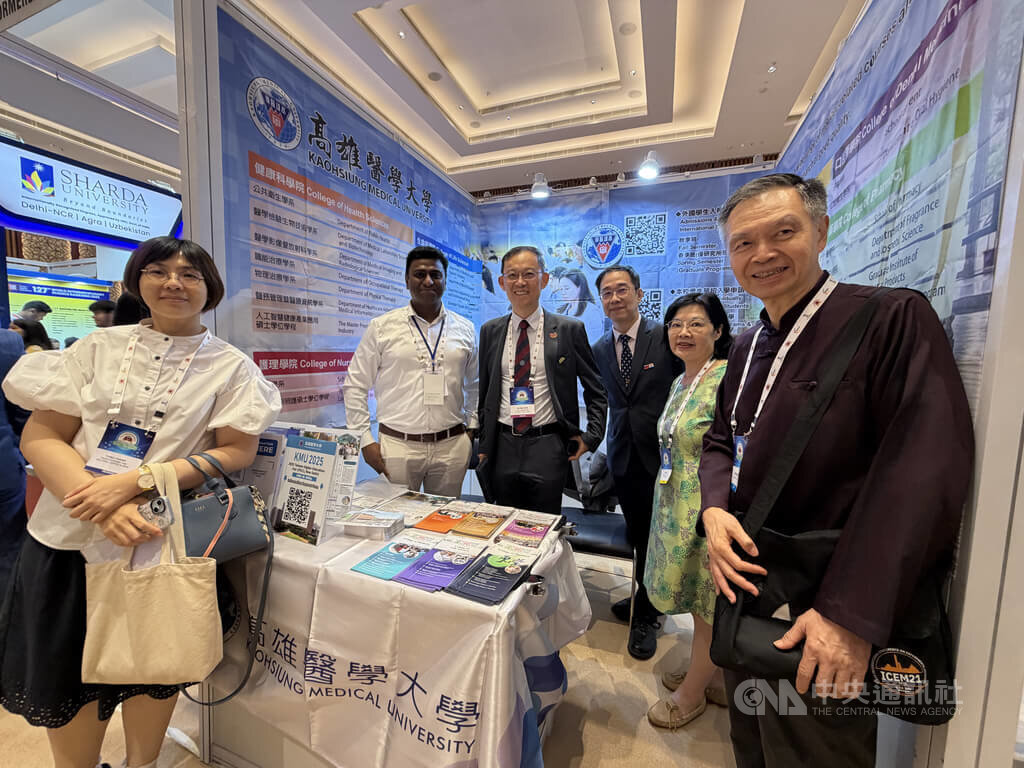
在台灣拿下博士學位的高雄醫學大學國際組組長庫碼(後排左1)鼓勵印度學生到台灣念書,因為台灣能獲得高品質教育,且是個安全可靠的地方,台灣的文化和整體氛圍,也能為印度學生成為具有潛力的國際學生,提供一個絕佳機會。中央社記者李晉緯新德里攝 114年10月6日
Dr. Vinoth Kumar (back row, first from left), Head of the International Office at Kaohsiung Medical University, who earned his Ph.D. in Taiwan, encourages Indian students to pursue their studies in Taiwan. He said that Taiwan offers high-quality education and is a safe and reliable place, while its culture and overall atmosphere provide an excellent opportunity for Indian students to grow into promising international talents.
(Photo by CNA correspondent Lee Chin-Wei, New Delhi, October 6, 2025)
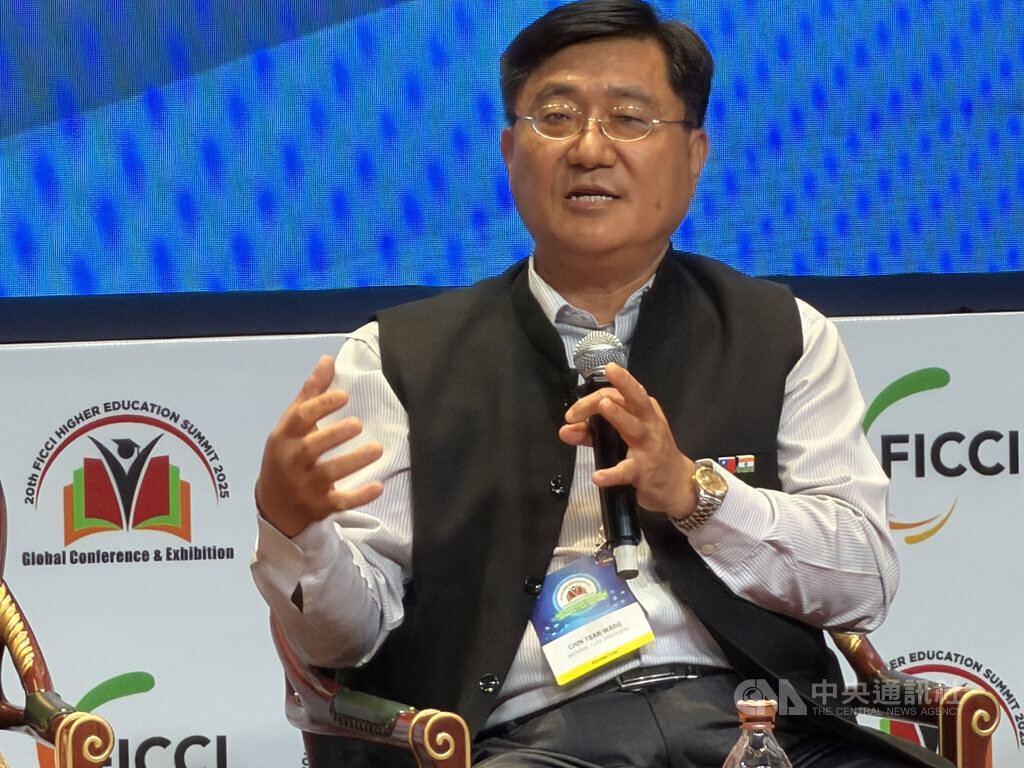
前駐印度代表處科技組組長、現宜蘭大學特聘教授王金燦(圖)表示,他認為印度應更積極讓學生到台灣學習,尤其是瞭解一些在工作文化上的細節,因台灣的學界與業界有很好連結,未來若要合作推廣高科技時,這將是創造台灣、印度雙贏的一大機會。中央社記者李晉緯新德里攝 114年10月6日
Dr. Wang Chin-Tsan (pictured), former Head of the Science and Technology Division at the Taipei Economic and Cultural Center in India and now a Distinguished Professor at National Ilan University, said he believes India should encourage more students to study in Taiwan, especially to learn about the nuances of Taiwan’s workplace culture. He noted that Taiwan has strong connections between academia and industry, and that such understanding will create a win-win opportunity for Taiwan and India in advancing high-tech collaboration in the future.
(Photo by CNA correspondent Lee Chin-Wei, New Delhi, October 6, 2025)

